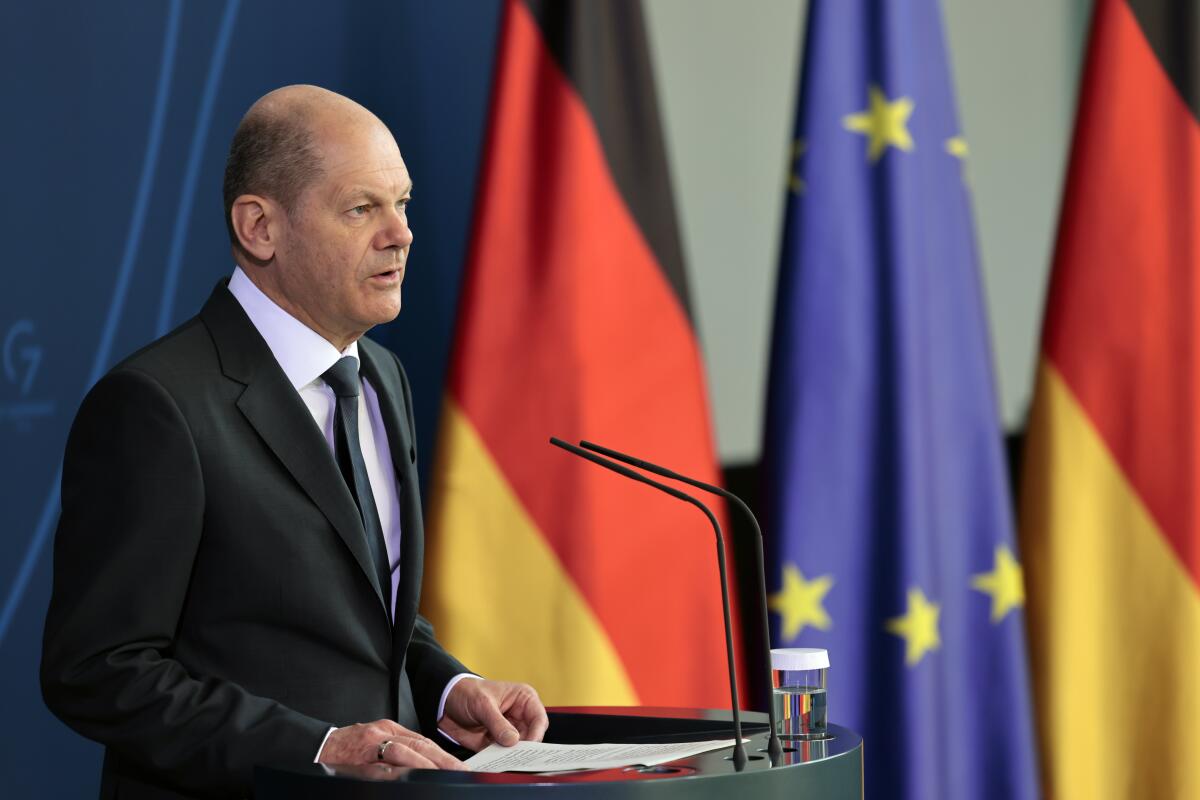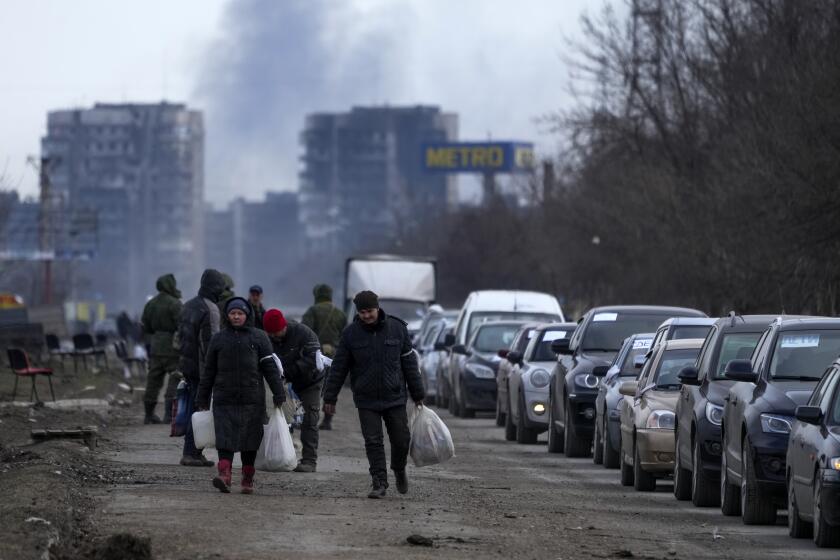What will it take for Germany, Europe’s heavyweight, to stand up to Russia?

- Share via
As the savage war in Ukraine continues, the world expects Germany, Europe’s largest economy and a political heavyweight, to play a central role in the fight to isolate and stop Russia. But how serious is Germany about supporting Ukraine?
On Feb. 27, in response to Russia’s invasion of Ukraine, German Chancellor Olaf Scholz announced a “historic change.” In a widely supported speech, Scholz reversed Germany’s foreign policy. Abandoning its stance of not sending weapons to crisis regions, Germany would now ship armaments to Ukraine to defend against Russia, Scholz said. Germany would boost its military spending, which Scholz’s party, the Social Democrats, campaigned against as recently as last fall. It would target Russia economically, supporting sanctions and potentially even denying Russia access to the SWIFT banking system. Scholz froze the completion of the controversial Nord Stream 2 natural gas pipeline from Russia, which would have ensured Germany’s energy dependence on Russia.
Urban warfare is the hardest type of battle. Russian forces aren’t prepared for the next phase of the fight into Ukraine’s metropolitan centers.
These moves were a 180-degree shift from Germany’s long-standing policy of “Wandel durch Handel,” or change through trade — the idea that Russia would be engaged most effectively through trade and economic integration. What neighboring countries and foreign critics saw as risky reliance on Russia, a series of German governments viewed as establishing better relations with an important regional power.
Yet almost two months after Scholz’s historic announcement, not much has happened on any of these fronts. Despite criticism from international observers and its own ministers, the German government has slow-walked its support for Ukraine.
Military aid has yet to be delivered. Estonia and the Czech Republic, far smaller countries than Germany, have donated more weaponry and arms to Ukraine than Germany has since the war began. No heavy weapons such as tanks, artillery or advanced air defense systems have been delivered at all.
Ukraine has offered to buy 100 German tanks, but Germany has balked, arguing that the North Atlantic Treaty Organization has to reach a joint decision among its members on the deal first. Even as the new Russian offensive in the Donbas region has begun, with indiscriminate shelling of population centers, the German government has not budged. Instead, German Defense Minister Christine Lambrecht announced that supplying Ukraine with further arms would undermine Germany’s defense capabilities.
Last week, Scholz announced Germany would provide $1 billion to Ukraine. That is likely to get parliamentary approval, but a decision has been delayed until June. Meanwhile, Russia receives $1 billion a day from Germany and other European countries from sales of its oil and gas. Germany is more dependent on Russian gas and oil than the rest of Europe, so cutting off its dependence would be a powerful signal of credible commitment to Ukraine. What’s more, it won’t necessarily have dire economic consequences for Germany.
Polls show that the German public supports sending both military and financial aid to Ukraine, with the majority supporting Scholz’s turnabout in policy. Although Germans are worried about cutting off the Russian energy supplies, their support for Ukraine is widespread.
So what’s stopping Germany? The inertia on economic and military aid cannot be explained by lack of popular support, potential damage to the German economy or even government coalition politics. Nor is it a question of German guilt over its Nazi legacy.
Instead, the failure to act exemplifies a persistent attitude among the German political establishment that there could be “no peace in Europe without Russia.”
In practice, this has meant prioritizing Russian interests. For decades, German elites dismissed the security interests of smaller countries around them, much as Russian President Vladimir Putin has.
Family and attorneys recall the difficulty of finding and communicating with people in immigration custody.
In the shared view of many Russian and German leaders, places such as Ukraine, Poland, the Czech Republic and the Baltic states are simply “the lands between” — upstart countries whose interests are not to be taken as seriously. Germany ignored their warnings about Putin and dismissed their opposition to Nord Stream 2. Ukraine now poses a difficult quandary: It is hard to justify a partnership with Russia when it is hell-bent on invading and eliminating Ukrainian sovereignty and national identity.
The ties between the German and Russian political elites reinforce this deference to Russia. Perhaps most notoriously, Gerhard Schröder, the former German chancellor, quickly gained a seat on the board of the Russian energy company Rosneft after leaving office and then energetically lobbied for Russian interests. Just weeks before the Russian invasion, Schröder was nominated to join the board of Gazprom, the Russian state company behind the Nord Stream 2 pipeline.
Other politicians have defended what they see as joint German and Russian interests. Frank-Walter Steinmeier, Germany’s president, defended Nord Stream 2 last year as “one of the last bridges between Russia and Europe” and, despite Russian aggression, argued that “we must not lose sight of the bigger picture.” Sigmar Gabriel, the former Social Democratic leader and energy minister, called for the “federalization of Ukraine” after the 2014 Russian invasion of Crimea, widely understood to mean a permanent Russian role in Ukraine. Even Scholz, the current chancellor, previously sought friendly ties with Russia, while ignoring Putin’s invasion of Georgia in 2008 and the aggression against Ukraine in 2014. For many German elites, appeasing Russia neatly dovetails with what they see as Germany’s economic interests: not just energy, but the billions sunk by Russian oligarchs into German real estate and industries.
In this mindset, addressing Ukraine’s survival without first considering Russian interests is nearly impossible. After all, Scholz’s predecessor, chancellor Angela Merkel, also “kept in mind what was tolerable for Russia,” as one of her top foreign policy advisors put it.
Germany is the political and economic leader of the European Union. Yet, time and again, it has deferred and submitted to Russia’s autocratic government. If the horrific invasion of a sovereign European country cannot change the minds of the politicians in Berlin, Germany is not only failing its moral obligations but also cementing its government’s reputation as being beholden to Putin.
Anna Grzymala-Busse is a professor of political science at Stanford University.
More to Read
A cure for the common opinion
Get thought-provoking perspectives with our weekly newsletter.
You may occasionally receive promotional content from the Los Angeles Times.











